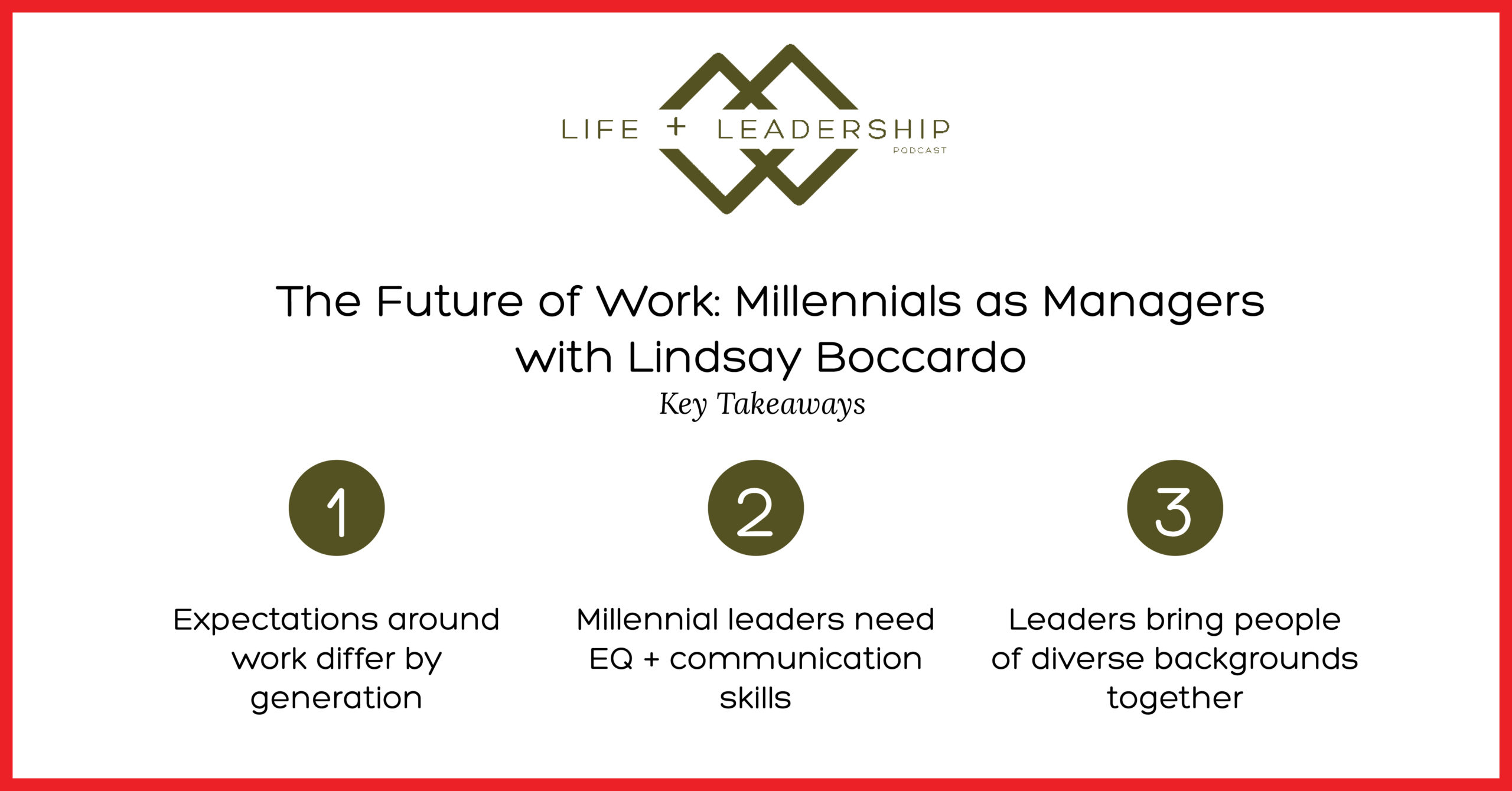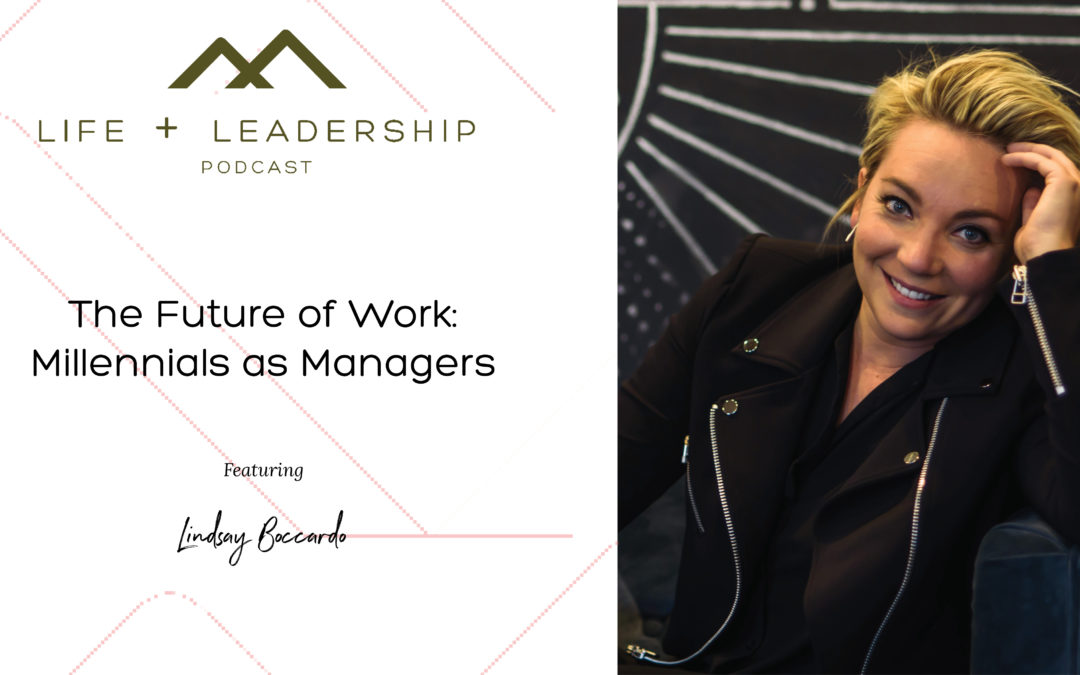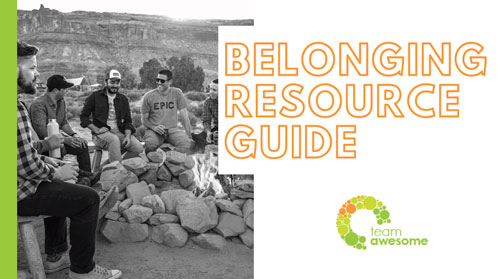By 2030, millennials will make up 75% of the global workforce. So, how do they differ from Gen Xers and boomers? And what can companies do to accelerate millennial leadership development?
Today, we’re joined by Lindsay Boccardo, the founder of Lindsay Boccardo Training and Coaching, a practice dedicated to helping companies understand how generational differences among employees impact their relationships at work. A highly sought-after professional speaker, Lindsay travels the US educating organizations seeking to maximize the talent of multiple generations in the workforce. She has been a professional iPEC Coach since 2012, supporting millennial clients in their transition to the ‘real world.’
Lindsay starts by sharing the differences among boomers, Gen Xers, and millennials in terms of their expectations around work. She offers her take on what’s behind the ‘Okay Boomer’ meme and why it’s dangerous to overgeneralize any generational group. Lindsay also discusses how the definition of leadership has changed, explaining the value of qualities like emotional intelligence, in-person communication skills and project planning for millennial managers. Listen in for insight around how your organization can support employees in developing learnability and find out why relevant, high-quality professional training and development is crucial to the future of work.
Themes explored in this week’s episode:
- What inspired Lindsay’s study of generations
- The differences among boomers, Gen Xers and millennials in terms of expectations around work
- How boomers, millennials and Gen Z view authority differently based on how they were raised
- Lindsay’s take on the ‘Okay Boomer’ meme and why it’s so contentious
- How the definition of leadership has changed + why EQ has become more important than tenure or performance
- How we can prepare millennials to lead older team members
- The in-person communication and project planning skills millennials tend to lack
- How companies can support employees in maintaining a growth mindset
- What companies are doing well when it comes to accelerating millennial leadership development
- Why relevant, high-quality professional training and development is crucial to the future of work
- Lindsay’s insight around owning where you’re at on your journey and taking the next step to get better

Resources from this episode:
- Connect with Lindsay at https://www.lindsayboccardo.com/
- Follow Lindsay on Instagram, Twitter or LinkedIn
- Check out Lindsay’s ‘Okay Boomer’ Video
- Access Lindsay’s Resource Library
- Explore Gallup’s Employee Burnout Study
- Follow Manpower Group’s research on work-readiness
- Learn more about GE’s rotational development programs
We would love to hear from you! Have an idea for a podcast or a question you want us to address? Interested in additional support, resources and workshops? Here are all the ways you can interact with us!
- Tweet us! @tegantrovato and @TeamAwesomeMKE
- Email us: tegan@BrightArrowCoaching.com and Katie@TeamAwesomeCoaching.com
- Follow us on Facebook @BrightArrowCoaching and @TeamAwesomeCoaching
- Follow us on Instagram @TeganTrovato and @katie_rasoul
- Connect with us on LinkedIn: Tegan Trovato and Katie Rasoul
- Watch the podcast on the Life & Leadership YouTube Channel
- Download free tools and sign up for our newsletters, events and workshops by visiting: https://www.brightarrowcoaching.com/ and https://www.teamawesomecoaching.com/
Quotes from the episode:
“I see myself as a translator. I came from Mars, and I’m like an actual Martian. I’m not somebody who studied Martians.”
“People who were parented by boomers expect that they will have a say [and] they will have more attention in the workplace than other generations because of how their parents raised them.”
“People who study history say that in the last decade, the world has changed more than it has in the last hundred years.”
“Technology … changes culture faster and faster. The faster you can communicate with each other, the faster culture can change. It becomes more volatile.”
“Can you bring a diverse group of people together—who have totally different backgrounds, totally different skill sets—and be the person that … brings everybody together to make it happen?”
“As leaders, it’s our job to listen and serve them where they’re at.”
“Millennials tend to be lacking in in-person communication skills.”
“Being a leader now is harder than it’s ever been.”
“To the degree that you believe you can grow, you will be able to grow.”
“Embrace the journey that you’re on. You don’t have to arrive today to be successful. Just take the next step.”



Recent Comments